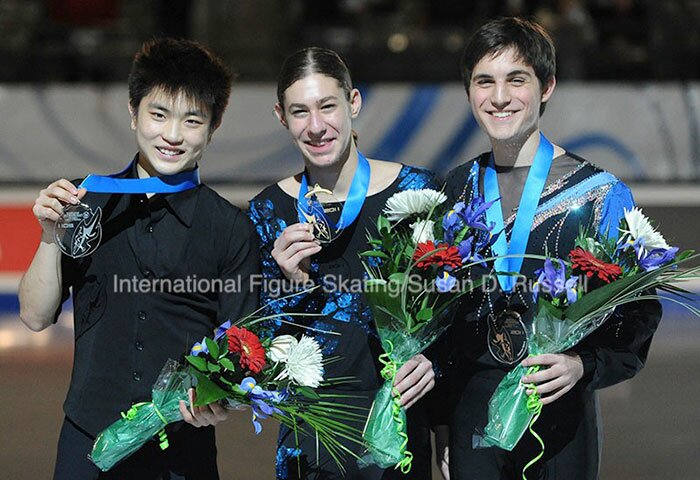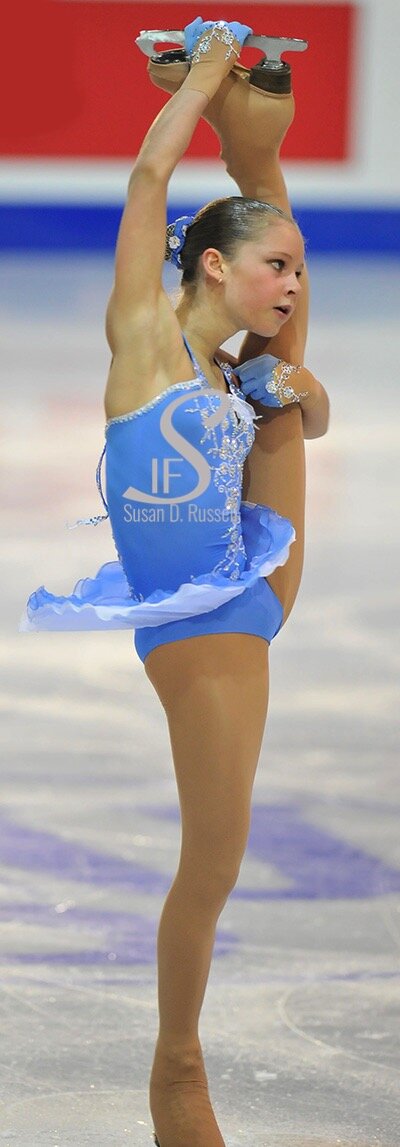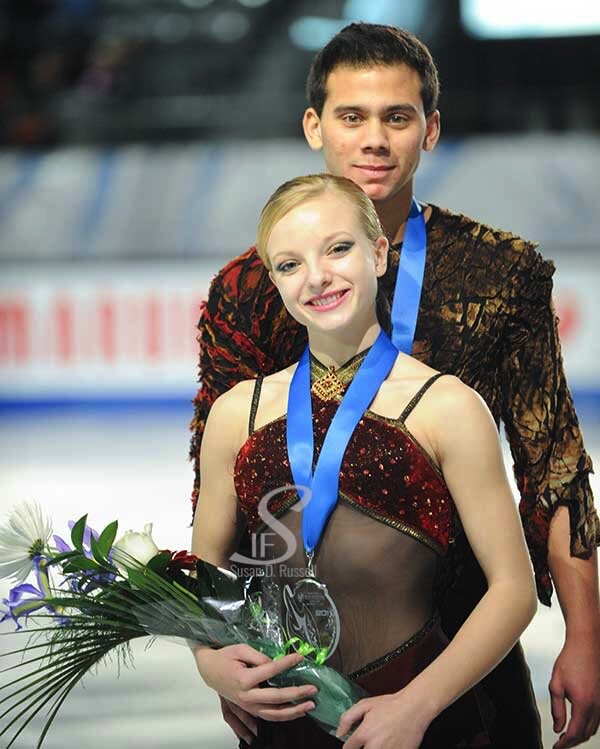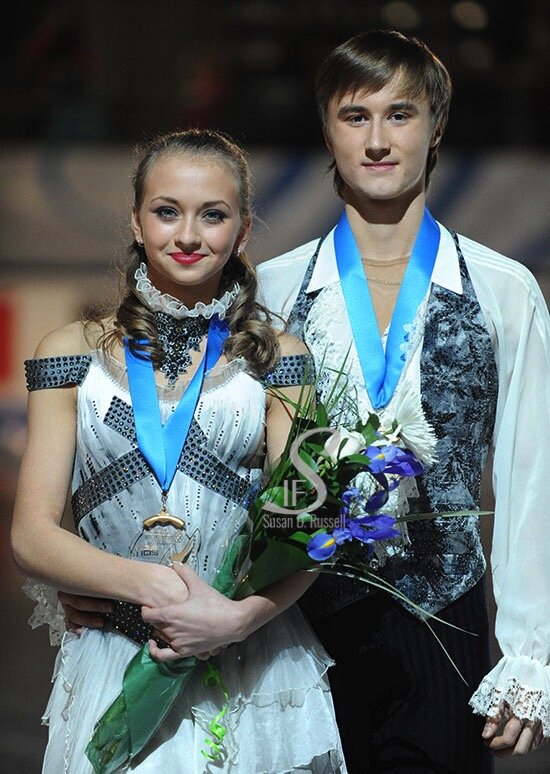

Many will remember the crop of talented juniors that burst onto the international stages a decade ago. Those in attendance at the 2011 Junior Grand Prix Final will surely never forget the showcase of talent they witnessed and how they set Québec City’s Pavillon de la Jeunesse on fire.
In the ensuing 10 years, some of those young stars have risen to the top echelons of the sport, while others who retired either turned to coaching or pursued an education and new careers outside of figure skating.
RETROSPECT
The seven-event Junior Grand Prix Series in 2011 played out in Latvia, Australia, Poland, Romania, Austria, Italy and Estonia, and culminated with the top six in each discipline qualifying for the Junior Grand Prix Final in Québec City, Canada.
Eight skaters and/or teams from Russia qualified for the final; six from the U.S.; three from China, along with two Ukrainian ice dance teams and one Canadian pairs team.
Russian skaters swept the ladies and ice dance podiums and left Québec City with six medals in hand. The U.S. captured three (one gold and two bronze), while China went home with two (gold and silver) and Canada’s sole entry at the Junior Final claimed silver.
The level of skating the juniors exhibited that season was exceptional, and provided a first glimpse of what was to come in the years ahead. At the time, the 2014 Olympic Winter Games were just two years away, and a quad of the 2011 junior stars would ultimately earn a place on their respective national teams: Jason Brown, Han Yan, Julia Lipnitskaia and Victoria Sinitsina and Ruslan Zhiganshin.
LEADING MEN
Two American men — Jason Brown and Joshua Farris — qualified for the Junior Final for the first time. Brown, who won the Grand Prix in Australia and finished second in Italy, headed into the competition ranked second in the standings behind China’s Han Yan.
The battle for gold began in the short program with all six men remaining vertical, and no deductions handed out across the board. Brown finished second in the segment, 4.22 points behind Farris and ahead of Yan.
In his long program, set to “Flow Like Water” by James Newton Howard, Brown, 16, landed seven triple jumps and fast well-centred spins, but without a triple Axel or quad he was no match technically for Yan and the American finished in second place.
In the end, Brown benefited from Yan having popped the triple Axel in the short, which cost him more than seven points, and claimed his first major international title with 208.41 points in total.
“I am speechless. My goal was just to make it to the Final, and just to be here is unbelievable,” said Brown with a wide smile. “I tried to stay calm and in the moment. Just to be around such amazing skaters and the top six senior men in the world is unbelievably motivating.”
Yan, who was suffering from a lingering cold, won the free skate but it was not without error. His long program to “Zigeunerweisen” by Pablo de Sarasate opened with a solid triple Axel, a quad toe and six other triple passes, but he again threw away points when he popped the jumps on the back end of two combinations. Yan captured his second consecutive Junior Grand Prix Final silver medal with 205.93 points.
The 15-year-old from Harbin coughed throughout the press conference but kept assuring everyone he was fine. “I was not my best today. I am not feeling so bad but I have been sick for a month now,” he explained. “I wanted to give my best in spite of the illness, so considering the circumstances I did OK.”
Farris won the short program but two falls in the free skate left him in third place overall. He opened his long program set to Rachmaninov’s “Piano Concerto No. 3” with a triple Axel immediately followed by a triple flip-triple toe combination. Midway through the routine he toppled to the ice during the footwork sequence and later popped a second triple Axel attempt.
But he did enough to stay in the mix and claimed the bronze with 203.98 points. “I am happy that I medaled but I am a little disappointed with how I skated,” the then 17-year-old admitted. “After the fall on the footwork it kind of hurt a little bit and I had to get my legs out from underneath me and I just couldn’t quite do it soon enough. I am very disappointed.”
Technical errors in the free and low Program Component Scores left Russia’s Maxim Kovtun, 16, in a distant fourth with 193.76 points. Japan’s Ryuju Hino and Keiji Tanaka, the 2011 World Junior silver medalist, finished fifth and sixth, respectively (172.75 and 171.14).
Where Are They Now?
Jason Brown and Han Yan still compete.
Joshua Farris suffered a series of concussions and was forced to retire from the sport in 2016. He is now a coach and choreographer.
OUTSTANDING LADIES
For only the second time in the 14-year history of the event, the ladies podium was swept by one nation — Russia. In 2006, a trio of U.S. ladies rewrote the record books with their unexpected sweep — Caroline Zhang, who won that competition by 20.67 points, Ashley Wagner and Megan Oster.
Five years later, it was a young Russian phenom named Julia Lipnitskaia who caused the biggest sensation in Québec City. Fourth at the senior Russian Championships the previous season, the 13-year-old won both her Grand Prix events in the fall (Poland and Italy) but her performances at the Final were unquestionably superior.

Julia Lipnitskaia
Lipnitskaia won the short program by a margin of 4.99 points and the long program by 12,40 points. Of the seven triple jumps she attempted in her “Romeo and Juliet” free skate the only miscue was an edge call on a triple Lutz. But it was her effortless stroking and amazing flexibility that, as the final note of her music faded, brought the partisan crowd to its feet in wild applause.
A combined score of 179.73 gave Lipnitskaia the victory and a winning margin of 17.39 points over the runner up. As a testament to her young talent, her score would have had her on the third step of the senior podium in Québec City, and just 0.03 of a point off the second.
“I was in a very good mood when I stepped onto the ice and I felt joy. During my program the happiness was flowing and I was very happy about my performance. I wasn’t expecting a standing ovation,” she said. “I am so happy for the two Polinas (Shelepen and Korobeynikova, who won silver and bronze, respectively) and myself. It was just great that the Russian girls swept the podium. You always have to go for the victory.”
Shelepen, 16, her good friend and training mate, attempted seven jumps in her took a tumble on a triple Salchow-triple toe combination, but moved on to complete her routine to Mendelssohn’s “Violin Concerto” with only an edge call on a three jump combination. She finished second with 162.34 points.
“We all skated well and everything felt great,” the Moscow native said. “It is not the first time that I fell on this combination. It is like a mental block. I got lower levels on my spins and I do not know why. I am extremely happy that three Russian ladies made the podium.”
At the time, Lipnitskaya and Shelepen were both coached by Eteri Tutberidze.
Korobeynikova, who was coached by Viktoria Volchkova, landed six triple jumps in her “Otonal” routine and scored 151.18. The 15-year-old was also happy with her performance and noted that the podium sweep “is a great step for our country.”
China’s Zijun Li finished fourth with 146.53, less than one point ahead of Vanessa Lam from the U.S. who sat in third after the short but wound up fifth overall (145.62 points). Risa Shoji from Japan was sixth (134.35).
Where Are They Now?
Julia Lipnitskaia retired in April 2017 and is now the mother of an 11-month old daughter, Katalina. She currently coaches at the Angels of Plushenko rink.
In 2013, Polina Shelepen — who was Tutberidze’s first student to achieve results on the international stages — switched countries and planned to compete for Israel. In 2014 she announced her retirement and now coaches children at a rink in Moscow.
Polina Korobeynikova retired in 2012 due to injuries.
SOLID PAIRINGS
China’s Wenjing Sui and Cong Han headed into the Final ranked first following their victories in Latvia and Austria.
The Harbin duo won both portions of the pairs competition in Québec City and skated away with the Junior Final title, their second in two consecutive appearances.
Sui and Han competed in both the junior and senior Grand Prix Series in the 2010-2011 season and qualified for both Finals. As it was only possible to compete at one level, the duo skipped the junior final that season and captured bronze at the senior Grand Prix. In Québec City, their Flamenco long program featured an almost-clean throw quad Salchow, a throw triple flip and Level 4 spins and lifts.
The two-time World Junior champions earned 160.43 points overall and while they were happy with their victory they were disappointed with their performance. “We had our best short program of the season but we are not too pleased with the long as we made some errors. The quad twist wasn’t too good either,” Han admitted.

Katherine Bobak and Ian Beharry
Canada’s Katherine Bobak and Ian Beharry, who joined forces just nine months earlier, captured the silver medal. The Ontario-based duo, coached by former Canadian pairs champions Kris Wirtz and Kristy Wirtz, were the host nation’s sole entrants at the junior level. Their “Spartacus” long program included a triple twist, a double Axel-double Axel jump sequence and a throw triple loop. The affable duo finished second with 152.65 points.
“It was a bit nerve-racking but it was a great experience to learn how to deal with that,” said Bobak.
The bronze went to the U.S. team of Britney Simpson and Matthew Blackmer who had been skating together for less than a year. They placed third in the short and fifth in the long but held on to capture the bronze medal with 146.35 points overall. “We are very excited. It was so amazing,” Simpson said at the post-event press conference.
Ekaterina Petaikina and Maxim Kurdyukov from Russia placed fourth, narrowly missing the podium with 146.17. China’s young team of Xiaoyu Yu and Yang Jin finished fifth with 144.71, and Russia’s Tatiana Tudvaseva and Sergei Lisiev placed sixth (133.79).
Where Are They Now?
Wenjing Sui and Cong Han continue to compete.
Katherine Bobak retired in 2012. In 2019, she graduated from Queen’s University with a Masters degree in Public Administration and is currently a Policy Analyst at Natural Resources Canada.
Ian Beharry continued skating one more season with a new partner but retired in 2013. He turned professional and tours the world performing on Royal Caribbean cruise ships.
Britney Simpson and Matthew Blackmer ended their two-year partnership in 2015. Simpson has been coaching at a rink in Arvado, Colorado, since her retirement. In 2019, she graduated from the Metropolitan State University of Denver with a Bachelor of Science degree in Human Performance and Sport.
Blackmer turned to ice dance and teamed up with Alexandra Aldridge. That partnership ended in September 2016 and he retired from competition, moving into the real estate and mortgage industry. He is now a senior account executive at firm in Detroit, Michigan.
Ekaterina Petaikina and Maxim Kurdyukov ended their partnership in 2012 following a sixth place finish at the World Junior Championships. Petaikina teamed up with Konstantin Bezmaternikh for one season and then retired.
RUSSIAN TWIZZLERS
Victoria Sinitsina and Ruslan Zhiganshin led the Russian sweep of the ice dance podium. After claiming silver at the event last season, the duo was on a mission to claim the top spot on the podium in Québec City.

Victoria Sinitsina and Ruslan Zhiganshin
Sinitsina and Zhiganshin took a solid lead after the short dance and laid down a solid performance in the free set to “Phantom of the Opera.” The duo earned Level 4s for five of the seven elements and claimed the title with 147.53 points. “We are very, very happy. We wanted to win,” said Sinitsina.
“This means a lot to us. It is something we had been working for,” Zhiganshin added. “It is motivation for us to go on and not to stop where we are now.”
Moscow’s Anna Yanovskaia, 15, and Sergei Mozgov, 16, captured the silver medal with a score of 136.61 points. Yanovskaia later said she found the audience very supportive and that “it is very easy to skate in Canada.”
Alexandra Stepanova and Ivan Bukin ranked fourth after the short dance, following a fall by Bukin on the twizzle sequence. The duo came back with a strong free dance and claimed their second bronze medal at a Final with a total score of 135.17.
“Last year we didn’t expect to be here at all, so we had no goals. This year, it was different. We wanted to be contenders. Unfortunately, because of the error in the short dance it didn’t quite happen,” said Bukin, who is the son of 1988 Olympic ice dance champion Andrei Bukin.
America’s Alexandra Aldridge and Daniel Eaton danced into fourth with 129.01, ahead of Ukraine’s fifth- and sixth-place finishers Anastasia Galyeta and Alexei Shumski (115.17) and Maria Nosulia and Evgeni Kholoniuk (113.79)
Where Are They Now?
Victoria Sinitsina ended the partnership with Ruslan Zhiganshin following a seventh-place finish at the 2014 World Championships. Two weeks later, on April 11, she teamed up with Nikita Katsalapov. A decade later they became the World ice dance champions.
That same month, Ruslan Zhiganshin teamed up with Elena Iliynkh, Katsalapov’s former partner. Zhiganshin retired in 2017 due to a spinal injury.
The partnership of Anna Yanovskaia and Sergei Mozgov ended abruptly in April 2016 when he decided to skate with another partner.
Yanovskaia subsequently switched countries to skate with Ádám Lukács of Hungary. The duo finished 23rd at the 2021 World Championships.
Mozgov teamed up with Betina Popova. The duo announced their retirement from competition in February 2020, a move instigated by Popova who stated she was suffering from and being treated for an eating disorder. Mozgov is now coaching.
Alexandra Stepanova and Ivan Bukin are still competing.
RELATED CONTENT:
2021-2022 COMPETITION CALENDAR




